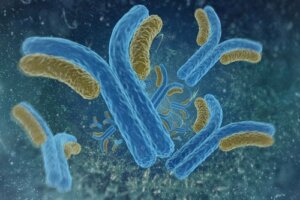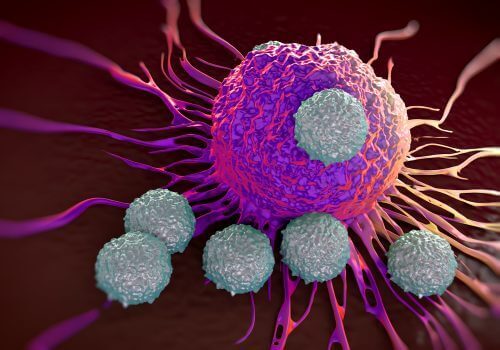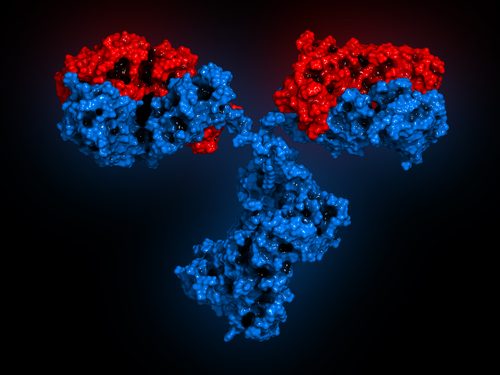What Are Antigens and Antibodies?

Antigens and antibodies are part of the immune system. They defend it, in the case of the antibodies, or attack it and cause the activation of the immune response, in the case of the antigens. Therefore, our immune system produces antibodies when it detects harmful elements, called antigens.
An antigen is a substance foreign to the body that the immune system recognizes as a threat. The great variety of antibodies that our body can synthesize is due to the random combinations of a set of genes that encode the different binding sites of antibodies to antigens.
Antigens and antibodies

The B lymphocytes are in charge of synthesizing the antibodies when the body detects antigens. Antigens can be both substances that come from outside and substances that have formed in our body.
Histocompatibility antigens (HLA) form in our body and are specific to each individual, although they’re not exclusive to any one individual. They’re found in cells and tissues. For this reason, when a cell or organ of one person comes into contact with the lymphocytes of another person, the lymphocytes will recognize the HLA as not being their own and destroy them.
Antibodies, as we’ve said, are proteins that the immune system synthesizes when it detects harmful elements, called antigens. Just as there are different types of antigens, there are different types of antibodies. Each type of antibody defends the body against a certain class of antigen.
How is the structure of the antibodies?
The structure that all the antibodies present are very similar, since all present in their composition a protein whose characteristic form is a “Y”. For this reason, antibodies will show this form.
Also, they present variations in the ends of this protein which is what differentiates them from antibodies. We refer to this part of the protein as the hypervariable region and, thanks to it, each variety of antibody binds to a different antigen.
When an antibody meets an antigen that’s complementary to it, it recognizes it and marks it so that other members of the immune system can attack it.
What is the function of the antibodies?

Antibodies fulfill the function of protecting the body since they’re part of the immune system. For this reason, in one way or another, they attack the intruder element when the body detects it.
Antibodies perform their function in three different ways:
- Preventing the entrance of pathogenic agents to the cells to avoid their damage.
- Triggering the elimination of pathogens by macrophages and other cells.
- Destroying the pathogen by activating other immune responses.
What’s the structure of antigens?
Antigens have a three-dimensional structure and a specific point–the epitope–where they unite with the antibodies. This makes it so that a great number of antibodies exist for each possible antigen since the same antigen can have different epitopes.
These union zones are a fundamental part of the structure of the antigens. This is because they’re the parts that an antibody can recognize as being specific to it and thus activate the immune response.
However, the antigens have areas called immunodominant. These are the zones of the antigen to which the majority of the antibodies bind.
You may also be interested in: Blood Types: Donate and Receive Blood
Role of antigens in the immune response
You should know that not all antigens are capable of activating the immune response since this also depends on the antibodies. If they stimulate the immune response, then we refer to them as immunogens.
These antigens are substances that our body isn’t able to recognize and therefore rejects them. They’re considered pathogenic agents that have specific complementary antibodies.
Conclusion on antigens and antibodies
Each antibody is assigned a specific antigen.
In other words, antigens and antibodies are complementary. Nevertheless, they’re complementary to destroy each other, since the antibodies recognize their complementary antigens and, at that moment, the immune response will be activated to be able to destroy the pathogen.
It’s pretty amazing, isn’t it?
All cited sources were thoroughly reviewed by our team to ensure their quality, reliability, currency, and validity. The bibliography of this article was considered reliable and of academic or scientific accuracy.
-
Vega, B. (2009). Anticuerpos. Medicgraphic-Inmunología Para El Médico General.
-
Anticuerpos: sus propiedades, aplicaciones y perspectivas. (2007). REVISTA MÉDICAS UIS.
-
Moro, L. (2010). Sistema Inmune. Bases Biológicas de La Producción Animal.
This text is provided for informational purposes only and does not replace consultation with a professional. If in doubt, consult your specialist.








